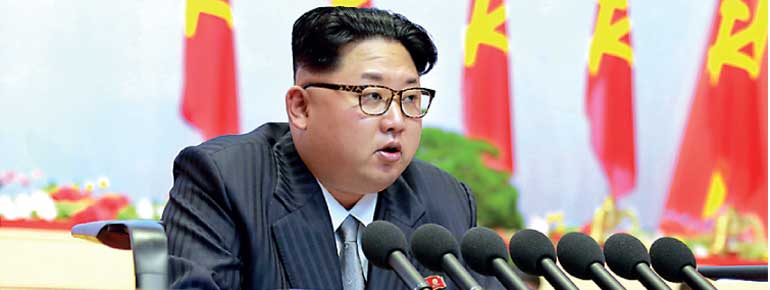Saturday Feb 21, 2026
Saturday Feb 21, 2026
Tuesday, 10 May 2016 00:01 - - {{hitsCtrl.values.hits}}
Reuters: North Korean leader Kim Jong Un said his country will not use nuclear weapons unless its sovereignty is infringed by others with nuclear arms, state media said on Sunday, and set a five-year plan to boost the secretive state’s moribund economy.
The North “will faithfully fulfil its obligation for non-proliferation and strive for the global denuclearisation,” Kim said in a report to a rare congress of the ruling Workers’ Party (WPK) that opened on Friday, the KCNA news agency reported.
Pyongyang was also willing to normalise ties with states that had been hostile towards it, Kim said.
Isolated North Korea has made similar statements in the past, although it has also frequently threatened to attack the United States and South Korea, and has defied United Nations resolutions in its pursuit of nuclear weapons.
 North Korean leader Kim Jong Un speaks during the first congress of the country’s ruling Workers’ Party in 36 years, in this photo released by North Korea’s Korean Central News Agency (KCNA) in Pyongyang May 6, 2016. KCNA/via Reuters
North Korean leader Kim Jong Un speaks during the first congress of the country’s ruling Workers’ Party in 36 years, in this photo released by North Korea’s Korean Central News Agency (KCNA) in Pyongyang May 6, 2016. KCNA/via Reuters
The first party congress in 36 years began amid anticipation by the South Korean government and experts that the young third-generation leader would use it to further consolidate power. Kim became leader in 2011 after his father’s sudden death.
North Korea’s economy is squeezed by UN sanctions that were tightened in March following its latest nuclear test, and Kim’s five-year plan to boost economic growth emphasised the need to improve North Korea’s electricity supply and develop domestic sources of energy, including nuclear power.
He laid out the blueprint in an address highlighting his “Byongjin” policy of jointly pushing forward economic development and nuclear armament.
On Sunday morning, foreign journalists were told to dress presentably and were brought to the People’s Palace of Culture, where dozens of black Mercedes-Benz sedans, with the 727 number plates reserved for top government officials, were parked.
However, after a one-hour wait in a lobby outside large wooden doors with frosted glass, the journalists were taken back to their hotel without having met any officials.
While the North Korean capital has been tidied-up as part of a 70-day campaign of intensified labour ahead of the congress, the 128 members of the foreign media invited to Pyongyang to cover the event had yet to be granted access to the proceedings.
State television broadcast Kim’s Saturday speech only on Sunday afternoon.
Secretive North Korea does not publish economic data, although South Korea’s central bank said last year the North’s economy grew by 1% in 2014. The estimate did not include grey market economic activity that has grown steadily in recent years and created an expanding consumer class.
Kim’s economic plan spelled out areas of focus, including more mechanisation of agriculture and automation of factories, and higher coal output, but gave few specific targets.
“(We must) solve the energy problem and place the basic industry section on the right track, and increase agricultural and light industry production to definitely improve lives of the people,” state media quoted Kim as saying.
North Korea came under toughened new UN sanctions in March after its most recent nuclear test and the launch of a long-range rocket, which put an object into space orbit, in defiance of past Security Council resolutions.
Since then, it has continued to engage in nuclear and missile development, and claimed that it had succeeded in miniaturising a nuclear warhead and launching a submarine-based ballistic missile.
“As a responsible nuclear weapons state, our Republic will not use a nuclear weapon unless its sovereignty is encroached upon by any aggressive hostile forces with nukes,” KCNA quoted Kim as saying on the second day of the meeting on Saturday.
Kim, 33, also called for improved ties with the rival South by erasing misunderstanding and mistrust, although he has made similar proposals in the past that led to talks by government officials that made little progress.
IAEA head says concerned about North Korea’s continued nuclear activities
Reuters (Cape Town): North Korea’s continued nuclear activities are of “great concern” to the region and beyond, the head of the International Atomic Energy Agency (IAEA) told reporters on Monday. |
N. Korea detains, expels BBC reporter
AFP: A BBC reporter in North Korea was detained, interrogated for eight hours and eventually expelled over his reporting in the run-up to a rare ruling party congress, the British broadcaster said Monday. |